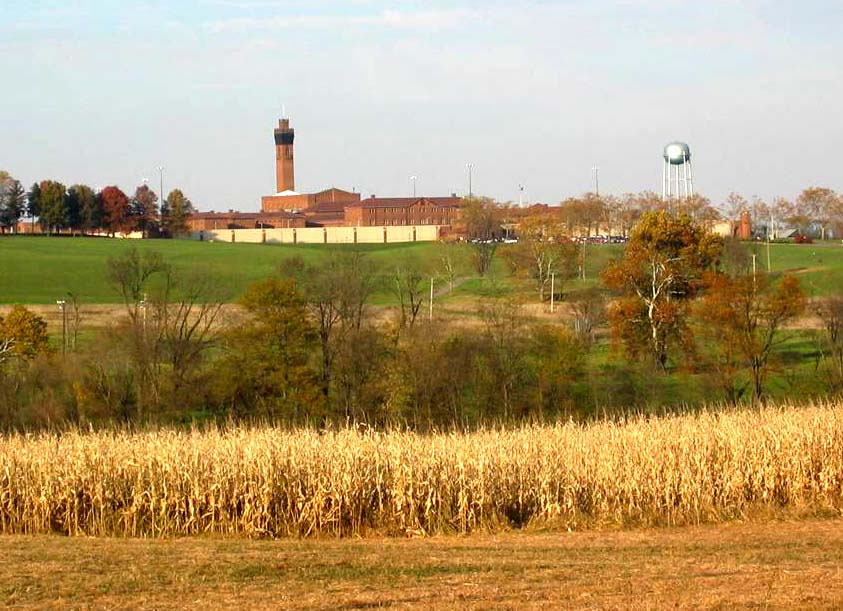
CC BY-SA 3.0
In 1942, shortly before the US joined the war, editor and lifelong pacifist Alfred Hassler registered as a conscientious objector. However, his commitment to nonviolence led him to refuse even the alternative to combat service: enrollment in a Civilian Public Service camp, as conscientious objectors were obliged to do. For this act of civil disobedience, he was sentenced to jail in 1944. Positioned as a leader in the Fellowship of Reconciliation, Hassler’s ethical stand against all forms of violence set him apart from many of his fellow inmates at Lewisburg Penitentiary in Pennsylvania, where he ultimately served for almost a year before parole. While incarcerated, Hassler kept a diary that documented his experiences, laying the groundwork for his later anti-war writings and providing an invaluable human record of life behind bars for those committed to principles over compliance.
The Diary Entry
Wednesday, September 6
Sunday was [his wife] Dot’s second visit here. It means so much to have her come, not only for the sake of seeing her, but for the breath of normalcy she brings. These monthly visits find me almost in a state of shock as I listen to Dot’s news about the office, and our friends and family. I remember them and think of them constantly, of course, but not of the everyday circumstances of their lives. I suppose unconsciously I see them spending most of their time concentrating on me and my experiences, and sharing the feelings of distress and outrage I have over the unhappy men in here.
Actually, of course, I can convey very little of this sort of thing to them, partly because prison rules forbid correspondence referring to any specific prisoner or the circumstances of his case, partly because it is out of the experience of knowing these men as persons, day after day, that the sense of outrage and indignation develops. It is not convincing to write that it is terrible to treat men so, and that they are really very much the same breed of humans as we. The person outside retorts quite reasonably that these men have committed crimes for which they are paying the penalty, that society has to do something to cope with the phenomenon of crime, and that anyway there are other, more pressing problems to deal with. An aunt wrote to me, after reading several of my letters, that she felt I was simply over-sensitive, and that most of the men do not really suffer as I think they do, at all.
I could see this in Dot’s face Sunday, too, as I loaded on her several new “assignments” of things to do for men in here. She is loyal, and she tries to do what I ask, but it is clear that she thinks I forget how many other things she has to do. She looks harried when I ask her to try to find someone who can convince the Virginia authorities that they ought to give Smitty another chance, or to find someone to talk to the Parole Board about Johnny Rae, or to get in touch with Bill Mason, still languishing in West Street.
She is right, of course, and the others are right. I do forget how many other things they have to do, and I ask the impossible every time Dot comes to visit. But I am right, too, and not because I am “over-sensitive.” Men do suffer in here, dreadfully, and not “men” in the abstract, but Bob, and Bill, and Slim and dozens of others who are personalities to me, friends for whom life has become a bleak, unhappy sequence of days without meaning and nights of torture. It is impossible to be in prison and escape this. I hear men pace their cells for hour after hour, hear them muttering unhappily to themselves, hear them, sometimes, sobbing quietly or cursing with a deep and bitter loneliness.
And with this I know, so often these days, the background of a friend’s behavior, dug out of the surreptitious looks at his file that I manage in the parole office. Here is a youth deprived of everything: raised in a family dominated by a brutal, drunken father, with no toys, no friends, no love, sent out to steal before he was ten, beaten savagely when he failed to bring home all that his father thought he should. How can it be surprising that he should have turned to crime and wound up in a federal prison at the age of twenty-two? And what will prison do for him, or for society, in the ten years he has to serve? When he is released, six or seven years from now, how will he have been improved, and how will the phenomenon of crime have been dealt with?
It is this that lacerates the spirit of the onlooking friend. Punishment and retaliation will not help. He has known them all his life, and they have driven him deeper and deeper into ruin. It is mercy he needs now, and it is only mercy and compassion that will do either him or society any good. He needs to know that men are not all his enemies, and that forgiveness and love exist, and can be extended to him. And so it is that a score of “over-sensitive” conscientious objectors keep filling their three letters a week and their one visit a month with pleas that somehow, somebody arrange to extend some mercy and compassion to Bill or Joe or Smitty or Bob. It does no good, most of the time. Society is not geared to the expression of compassion. But we go on pleading because we have to, because we could not live with ourselves if we did not.
Further Reading
Alfred Hassler’s diary was published by Henry Regnery Company in 1954, a decade after his imprisonment, titled, Diary of a Self-Made Convict. Now out of print,
Also…

Leave a Reply